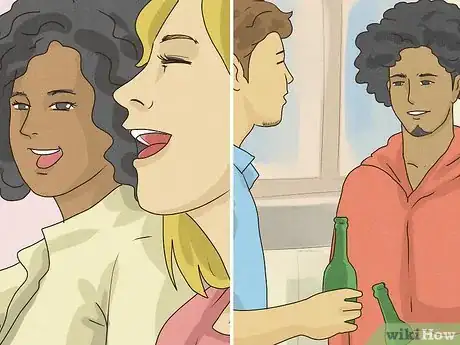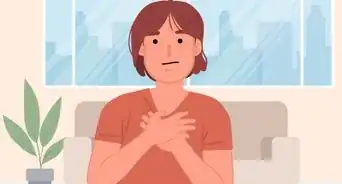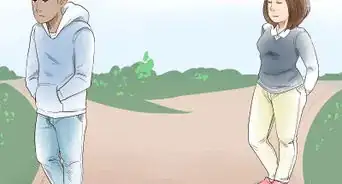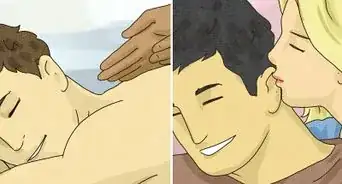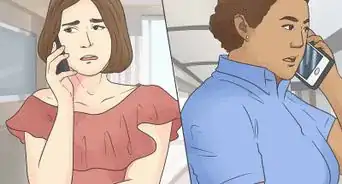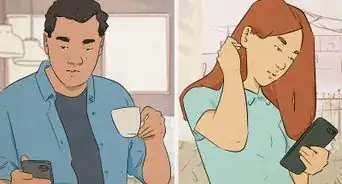This article was co-authored by Jason Polk, LCSW, LAC and by wikiHow staff writer, Hannah Madden. Jason Polk is a Relationship Counselor and the Owner of Colorado Relationship Recovery. With over 12 years of experience as a therapist, he specializes in helping couples build healthy and thriving relationships through counseling. Jason holds an MSW from Newman University, Colorado Springs. He is also a Level II Psychobiological Approach to Couple Therapy (PACT) therapist, Healing Our Core Issues (HOCII) Certified therapist, and has training in Relational Life Therapy (RLT).
There are 8 references cited in this article, which can be found at the bottom of the page.
This article has been viewed 103,226 times.
Having issues in a long-term relationship is totally normal, especially after you’ve gotten out of the honeymoon phase. But figuring out the difference between a catastrophic problem and one that can be worked on is a little tough, especially if you two are going through a rough patch right now. In this article, we’ve compiled some of the most telling signs that you and your partner have a loving, healthy relationship (even if it doesn’t quite feel like it right now). Read through this list to see how strong your partnership is as you figure out what to do next.
Steps
Expert Q&A
-
QuestionWhat is the biggest deal breaker?
 Jason Polk, LCSW, LACJason Polk is a Relationship Counselor and the Owner of Colorado Relationship Recovery. With over 12 years of experience as a therapist, he specializes in helping couples build healthy and thriving relationships through counseling. Jason holds an MSW from Newman University, Colorado Springs. He is also a Level II Psychobiological Approach to Couple Therapy (PACT) therapist, Healing Our Core Issues (HOCII) Certified therapist, and has training in Relational Life Therapy (RLT).
Jason Polk, LCSW, LACJason Polk is a Relationship Counselor and the Owner of Colorado Relationship Recovery. With over 12 years of experience as a therapist, he specializes in helping couples build healthy and thriving relationships through counseling. Jason holds an MSW from Newman University, Colorado Springs. He is also a Level II Psychobiological Approach to Couple Therapy (PACT) therapist, Healing Our Core Issues (HOCII) Certified therapist, and has training in Relational Life Therapy (RLT).
Relationship Counselor Wanting/not wanting kids is one of the most common deal breakers. If you and your partner truly have opposing viewpoints on this issue, it might be better to break things off instead of putting off the conversation for later.
Wanting/not wanting kids is one of the most common deal breakers. If you and your partner truly have opposing viewpoints on this issue, it might be better to break things off instead of putting off the conversation for later. -
QuestionHow do you know if you should consider divorce?
 Jason Polk, LCSW, LACJason Polk is a Relationship Counselor and the Owner of Colorado Relationship Recovery. With over 12 years of experience as a therapist, he specializes in helping couples build healthy and thriving relationships through counseling. Jason holds an MSW from Newman University, Colorado Springs. He is also a Level II Psychobiological Approach to Couple Therapy (PACT) therapist, Healing Our Core Issues (HOCII) Certified therapist, and has training in Relational Life Therapy (RLT).
Jason Polk, LCSW, LACJason Polk is a Relationship Counselor and the Owner of Colorado Relationship Recovery. With over 12 years of experience as a therapist, he specializes in helping couples build healthy and thriving relationships through counseling. Jason holds an MSW from Newman University, Colorado Springs. He is also a Level II Psychobiological Approach to Couple Therapy (PACT) therapist, Healing Our Core Issues (HOCII) Certified therapist, and has training in Relational Life Therapy (RLT).
Relationship Counselor Take a look at how often you fight, how verbally abusive you are to one another, as well as when you fight. If you're verbally abusive in front of your children, then you definitely need to separate—it's very hard for kids not to assume that your fights are about them.
Take a look at how often you fight, how verbally abusive you are to one another, as well as when you fight. If you're verbally abusive in front of your children, then you definitely need to separate—it's very hard for kids not to assume that your fights are about them.
References
- ↑ https://www.psychalive.org/how-to-stop-fighting/
- ↑ Jason Polk, LCSW, LAC. Relationship Counselor. Expert Interview. 24 November 2021.
- ↑ https://youth.gov/youth-topics/teen-dating-violence/characteristics
- ↑ Jason Polk, LCSW, LAC. Relationship Counselor. Expert Interview. 24 November 2021.
- ↑ https://www.psychologytoday.com/us/blog/contemplating-divorce/201101/how-do-you-know-if-you-should-stay-or-go
- ↑ https://www.psychologytoday.com/us/blog/contemplating-divorce/201101/how-do-you-know-if-you-should-stay-or-go
- ↑ https://www.psychologytoday.com/us/blog/contemplating-divorce/201101/how-do-you-know-if-you-should-stay-or-go
- ↑ Jason Polk, LCSW, LAC. Relationship Counselor. Expert Interview. 24 November 2021.
- ↑ https://www.today.com/health/9-warning-signs-you-may-be-headed-divorce-t103116
- ↑ https://www.today.com/health/9-warning-signs-you-may-be-headed-divorce-t103116
- ↑ https://www.psychologytoday.com/us/blog/contemplating-divorce/201101/how-do-you-know-if-you-should-stay-or-go
- ↑ https://pubmed.ncbi.nlm.nih.gov/21401225/
- ↑ https://www.betterhealth.vic.gov.au/health/healthyliving/relationships-and-communication
- ↑ https://www.psychologytoday.com/us/blog/compassion-matters/201203/why-the-spark-fades-in-relationship
- ↑ https://youth.gov/youth-topics/teen-dating-violence/characteristics



